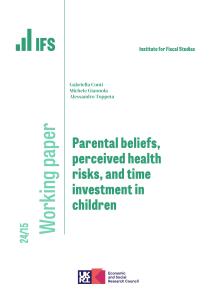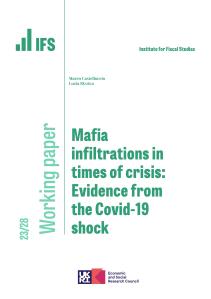It looks likely that responding to the coronavirus outbreak (covid-19) will be at the centre of Wednesday’s Budget. The scale, and therefore impact, of the virus remains hugely uncertain, so policymaking is difficult. Policies need to be robust to different eventualities and/or be flexible in the face of change. The key focus of an economic policy response should be to ensure continued delivery of public services and tominimise the long-term effects of what will hopefully be a short-term increase in levels of illness. The latter focus points to targeted interventions to ensure that otherwise healthy businesses do not go to the wall. Policymakers should also consider whether broader interventions to support workers who do lose their jobs or face cuts in income would be appropriate.
What short-run impact might it have?
There are likely to be negative effects on both the demand side and the supply side of the economy. This could be substantial but hopefully short-lived.
Negative supply shocks could come as some workers have to self-isolate, or are ill. An additional impact could come from parents and other carers having to remain at home if nurseries, schools or facilities for caring for the sick and elderly are closed. Indeed Simon Wren-Lewis projects that this latter effect could dwarf the economic impact of workers staying at home because of the illness itself.
On the demand side we are already seeing big falls in demand for flights, for example. We may well already be seeing, or will soon see, spending on eating out, attending events and so on falling as consumers avoid crowded public places. This could extend to much of the retail sector. As Professor Wren-Lewis points out a lot of our consumption is “social” and the economic loss from reducing social consumption won’t be made up by additional spending as soon as the virus outbreak has passed. If I don’t go out for a meal for the period of the outbreak I’m unlikely to make up for it by going out for extra meals later on. These demand side effects could be more economically significant than the supply side impacts.
A further impact on demand that will be much longer lived could come from the recent sharp falls in the stock market. Unless the stock market bounces back these falls will reduce future incomes, and therefore spending, most obviously when individuals reach retirement and draw on their accumulated defined contribution pension pots.
What did the government do in response to the financial crisis?
It’s only 12 years since the financial crisis. That resulted in a huge, and to some extent internationally coordinated, monetary and fiscal response. When thinking about what Chancellor Rishi Sunak might do in his Budget it is worth remembering what the UK’s fiscal response was to that crisis. That is not because the appropriate response will be the same this time, but by way of illustration and for purposes of comparison.
- The total UK fiscal stimulus package was 0.6% of GDP in 2008–09 and 1.5% of GDP in 2009–10. That’s a stimulus of about £12 billion and £30 billion in terms of current day GDP.
- Tax cuts amounted to 0.9% of GDP in 2009–10. The largest was a 13 month cut in the main rate of VAT from 17½% to 15%, but there were also some measures to help cash-strapped small businesses and to incentivise companies to invest.
- Some benefits were made more generous (adding under 0.1% of GDP to spending in both years). This included higher benefit payments to pensioners and families with children in January 2009 and an increase in the winter fuel payment to those aged 60 and over in the winter of 2009–10.
- Day-to-day spending on public services was increased (0.3% of GDP in 2009–10).
- Investment spending was also increased substantially (0.3% of GDP in 2009–10).
- Finally, the government largely kept to planned spending increases despite these, ex-post, being more generous (in real terms and as a share of GDP) than intended. This included honouring most of the multi-year public sector pay deals that had been struck prior to the crisis.
Some of these responses do not look appropriate in the current situation. Encouraging people to go out and spend more through a generalised VAT cut might not work as a slightly lower price for “social” spending might not lead to a boost in demand during the coronavirus outbreak. Of course if demand did increase then this could be counterproductive to efforts to lower social interactions in the short run. Increasing in investment spending might help if there is a longer lasting economic effect but it cannot possibly help over a three-month period when covid19 might be at its peak. It seems unlikely that incentivising companies to invest is a priority in the face of this particular threat.
So what should government do now?
For now, there are three sorts of response that might be required:
- Supporting affected businesses to help prevent this largely short term event having long term “scarring” effects;
- Supporting individuals who lose income;
- Ensuring the delivery of public services.
The first of these, efforts to prevent scarring, is probably the most important from a long term economic point of view. If reduction in consumer demand is concentrated on certain industries, and liquidity constrained companies go out of business despite being long-term viable, this would reduce the longer term capacity of the economy. This could mean giving more generous payment terms to businesses for some taxes such as business rates and employer NICs. The government, with the Bank of England, might want to work with the financial sector to avoid banks foreclosing on businesses in temporary difficulties. There may be other policies that could help in this space.
The benefit system is supposed to provide support to individuals during difficult times. In principle for many Universal Credit (UC) should automatically provide more support when incomes fall though, of course, UC has not been tested through a downturn. The Government will need to ensure that the system can cope with an increase in new claims, and in particular new claims from individuals who need to self-isolate. There might well be a case for a temporary increase in spending on out-of-work benefits as we might be less concerned about financial incentives to work during a pandemic.
There may also be policies needed to help ensure that public services can continue to operate: for example, some additional funding might be needed so that temporary staff can be engaged during periods when employees are not able to work. Obvious settings where this could help ensure service delivery will include the use of agency nurses in NHS hospitals and supply teachers in primary and secondary schools.
What about the longer-term?
The coronavirus outbreak may also require longer-term policy adjustment. This could come from lessons learned from the experience of this year. Reforms may also be needed if the virus does turn out to have longer-term implications: for example, if consumers and business permanently change their economic behaviour because they perceive (rightly or wrongly) that such outbreaks will be more common in the future. But these are issues that can be left to future Budgets, when the actual scale and duration of the coronavirus outbreak will be much more certain. For now, Chancellor Sunak should be focussing on ensuring the continued delivery of public services and measures to minimise the long-term economic damage from what will hopefully be a short-term increase in levels of illness.









